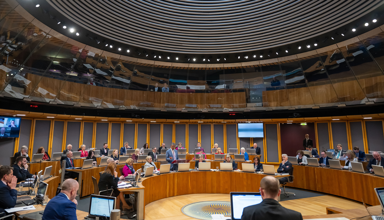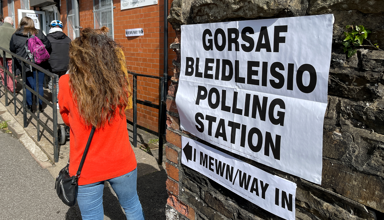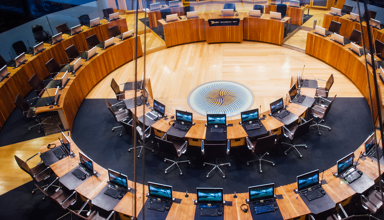At the Senedd election on 7 May 2026, you’ll be voting to elect Members who will represent your community in the Welsh Parliament.
But what does that actually involve?
From debating laws in Cardiff Bay to supporting people in their local areas, Members of the Senedd play a vital role in shaping life in Wales.
This blog explores what they do – both in the Senedd and in your community – and how you can get involved.
In the Senedd
Plenary
Members of the Senedd are elected from all over Wales to represent you and your community in the Welsh Parliament.
During term time, all Members of the Senedd meet twice a week in the Siambr – the debating chamber – for Plenary.
Plenary is chaired by the Presiding Officer (Llywydd) and is the main forum for Members to carry out their role as your elected representatives.
This is where they speak on your behalf, question Welsh Government Ministers, debate and vote on important issues, and pass laws.
Asking Questions
One way Members can bring local issues to the attention of the Senedd is to table a question.
These can be directed to the First Minister every week, or to other Cabinet members and the Senedd Commission every four weeks.
If something urgent or important comes up – locally or nationally – Members can request to ask Topical or even Emergency Questions if a quick answer is needed.
Short debates
Members can have short debates to highlight issues that matter to their communities.
Short debates differ from other debates as they allow any Member (except Welsh Government Cabinet Secretaries and Ministers) to lead a general debate on a topic they care about, or an issue from their constituency.
The Presiding Officer holds regular ballots to select Members for short debates. A selected Member will open the debate on a topic of their choice, and a Minister or Senedd Commissioner usually responds.
In committees
Most Members of the Senedd also sit on committees.
Committees are small groups of Members who look at specific topics or issues that affect the lives of people in Wales.
Committees are where much of the detailed work of the Senedd happens. They allow Members to examine issues in depth and hear directly from the public and experts.
Members don’t just attend committee meetings. They look at research and evidence and visit communities affected by the issue they are examining. They make recommendations for change and participate when committee reports are debated during Plenary.
Find out more about how committees work.
In your community
When they’re not working in the Senedd, most Members have a local office in their constituency or region.
As well as being politicians, they’re part of your community.
They hold drop-in sessions, called surgeries, so you can meet them and discuss local issues that concern you. You can also contact them online or over the telephone.
They will help if they can, and Members’ office staff help them to manage ongoing constituent queries.
After hearing from you, your Member could raise your concern in the Senedd. They can ask a question or arrange a debate in Plenary.
Members also visit schools, businesses, and other local organisations to build connections with the people they represent. These visits help them understand what’s happening locally and bring those voices back to the Senedd.
Members’ business and staffing costs
Financial support is available for Members of the Senedd to help them carry out their duties.
Members’ pay and what business and staffing costs they may claim, including any limits or restrictions, is set by an independent remuneration board. The claims process is managed by the Senedd Commission. Details of Members’ claims are published online.
Financial support is available for things like running a local office, travelling across Wales, and employing staff to assist with casework and research. Further information about financial support for Members is available on the board’s website.
This provision helps remove financial barriers, so that individuals from a wide range of backgrounds can stand for election and represent their communities.
Contacting your Members
Everyone in Wales is represented in the Senedd by five Members. One for your local area (constituency) and four for the region of Wales you live in.
You can contact any of them – in person, online, or by phone – no matter who you voted for. All five represent you equally.
Not sure who your Members are? Use your postcode to search for them







